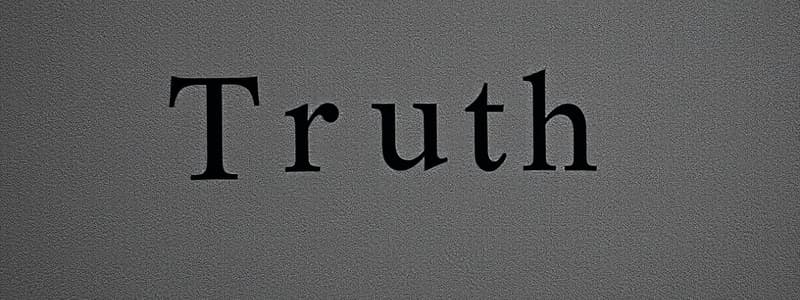Podcast
Questions and Answers
What is the primary characteristic that defines truth?
What is the primary characteristic that defines truth?
- It is influenced by emotional responses.
- It is based solely on personal belief.
- It is always agreed upon by the majority.
- It can be proven and justified using logic. (correct)
How does logic contribute to our understanding of truth?
How does logic contribute to our understanding of truth?
- It provides a method to ascertain valid reasoning. (correct)
- It relies on emotional attitudes.
- It simplifies complex ideas without explanation.
- It allows for subjective interpretations.
Which of the following best describes knowledge?
Which of the following best describes knowledge?
- A belief held by a large group.
- An understanding proven by logic and experience. (correct)
- An emotional response to an event.
- A collection of opinions on various subjects.
What differentiates opinions from truth?
What differentiates opinions from truth?
Which fallacy involves attacking a person instead of addressing their argument?
Which fallacy involves attacking a person instead of addressing their argument?
What does the fallacy of Hasty Generalization involve?
What does the fallacy of Hasty Generalization involve?
Which fallacy assumes that what is true for a part is also true for the whole?
Which fallacy assumes that what is true for a part is also true for the whole?
What characterizes the fallacy of Begging the Question?
What characterizes the fallacy of Begging the Question?
Flashcards are hidden until you start studying
Study Notes
Definition of Truth
- Truth is defined as a concept that can be proven and justified through logic, human faculties, and senses.
- It must align with factual and valid reasoning, recognizable through common human understanding.
Logic
- Logic is both a science and an art focused on valid reasoning.
- Essential for determining truth; without logic, discerning truth becomes challenging.
- Common sense acts as a basic framework for sound judgment and perception of facts.
Knowledge
- Knowledge involves understanding or grasping concepts fully.
- Can be validated through logical reasoning, intellect, and experiences.
Opinions vs. Truth
- Opinions stem from personal beliefs and self-expression regarding a subject.
- Distinction exists between subjective opinions and objective truth.
Arguments
- Arguments are statements designed to persuade others of a point’s truthfulness.
- Provide reasoning to support claims and challenge opposing views.
Fallacies
- Fallacies are misleading and erroneous statements that weaken arguments.
Types of Fallacies
- Appeal to Pity: Manipulating emotions or sympathy to persuade.
- Ad Hominem: Attacking the individual rather than addressing the argument.
- Ad Baculum: Utilizing force or authority to avoid answering an argument directly.
- Hasty Generalization: Drawing conclusions from insufficient evidence, leading to illogical outcomes.
- Post Hoc: Assuming a false cause-and-effect relationship between events.
- Ad Populum: Validating an argument based on its popularity among many.
- False Analogy: Misusing similarities between two ideas or terms in comparison.
- Dicto Simpliciter: Generalizing that what is true in a general sense applies to all cases.
- Fallacy of Composition: Assuming that truths applicable to parts are also true for the whole.
- Fallacy of Division: Assuming that what is true for the whole must be true for individual parts.
- Petitio Principii (Begging the Question): Assuming a conclusion within the premise without proof, treating debated matters as established truths.
Studying That Suits You
Use AI to generate personalized quizzes and flashcards to suit your learning preferences.



